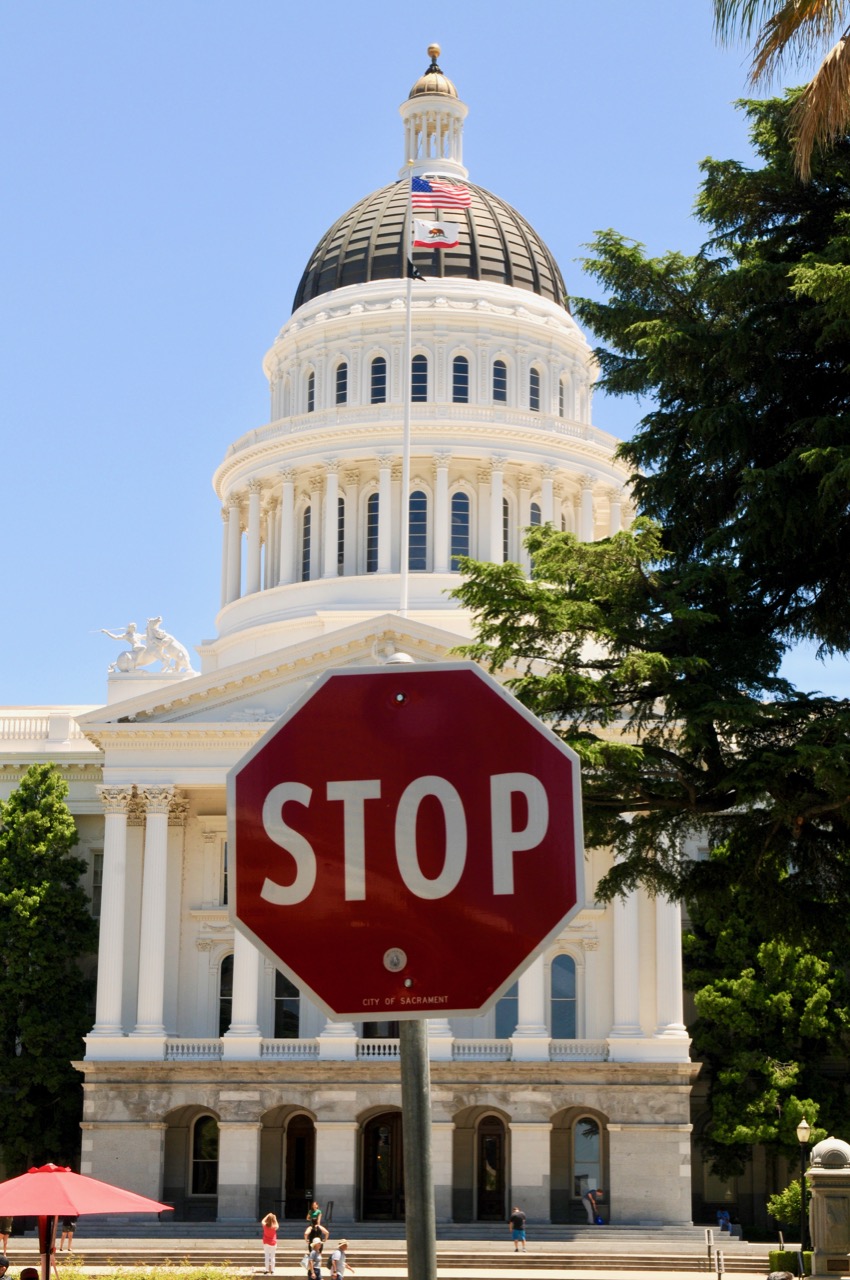
Legal books. (Photo: ebay)
Trial Court Judge Rules Governor’s Executive Orders Are Limited in Scope
It is an interesting case study based upon the separation of powers doctrine
By Chris Micheli, November 2, 2020 9:40 pm
For those interested in the tensions between the legislative and executive branches of state government, today’s decision by a Sutter County Superior Court judge regarding Executive Orders (EOs) issued by Governor Newsom is an interesting case study based upon the separation of powers doctrine.
In essence, the judge ruled that Executive Orders that amend statutes violate the state Constitution. The Executive Order at issue in this case, Executive Order N-67-20, dealt with several provisions of the California Elections Code.
The separation of powers doctrine essentially provides that those who exercise power in one branch of government cannot exercise the powers of the other two branches of government. California’s separation of powers doctrine is set forth in Article III, Section 3 of the state Constitution. Section 3 provides: “The powers of state government are legislative, executive, and judicial. Persons charged with the exercise of one power may not exercise either of the others except as permitted by this Constitution.”
In addition, three articles of the state Constitution (Articles IV (legislative), V (executive), and VI (judicial)) dealing with the three branches of state government establish the roles of the three branches. For example, Article IV, Section 1 of the California Constitution provides: “The legislative power of this State is vested in the California Legislature which consists of the Senate and Assembly, but the people reserve to themselves the powers of initiative and referendum.”
The trial court judge made several rulings Monday afternoon as outlined below.
First, the trial court judge found that the case is not moot. “First and foremost, the legal controversy for which plaintiffs have requested declaratory relief is not limited to the validity of Executive Order N-67-20… The controversy at issue in this case is broader, specifically whether the Governor has the authority under the California Emergency Services Act (Gov’t. Code Secs. 8550-8669.70) to exercise legislative powers by unilaterally amending, altering, or changing existing statutory law or making new statutory law.” Also, “Not only is this an active and ongoing controversy between the parties, but it is a critically important one for the Judicial Branch to resolve.”
Second, the trial court judge found that the California Emergency Services Act is constitutional. In her ruling, the judge found “The plain meaning of the CESA does not delegate to the Governor the power to legislate, and therefore does not violate the separation of powers under California Constitution Article Three, Section 3.” Plaintiffs argued that, if the Governor’s interpretation of the CESA were accepted, “the Act would be an unconstitutional delegation of power to legislate in violation of the separation of powers.”
Furthermore, the trial court judge ruled, “the plain language of Section 8567 only allows the Governor to ‘make, amend, and rescind orders and regulations.’” Specifically, the judge ruled, “Section 8567 does not empower to Governor to make or amend statutes.” In addition, the trial judge determined that, “Section 8627 does not empower a governor to make or amend statutory law, by its own language and by specifying that the powers shall be exercised in accordance with Section 8567.” Finally, she found that “The Constitution gives the legislative branch the exclusive authority to make law and the executive branch the power to see that the law is faithfully executed.”
Third, regarding the issue of whether EO N-67-20 was authorized by the CESA, the court found that the executive order was not authorized by the CESA because it improperly amended existing statutory law, exceeding the Governor’s authority and violating the separation of powers doctrine. Here, the trial court judge said, “The CESA allows the Governor, during a state of emergency, to issue orders and regulations and to suspend certain statutes, but the plain and unambiguous language of CESA does not permit the Governor to amend statutes or make new statutes.”
Moreover, the trial court judge ruled that “The Governor does not have the power or authority to assume the Legislature’s role of creating legislative policy and enactments…. However broad are the police powers given to a governor by the CESA, those powers remain subject to constitutional restraints.” She said that EO N-67-20 amended sections of the Elections Code and, as a result, it exceeds the Governor’s authority under CESA.
Fourth, regarding whether the plaintiffs are entitled to declaratory relief, the court decided they are entitled to it. “A court may resolve a concrete dispute that is before it in a declaratory relief action when the consequences of a deferred decision would be lingering uncertainty in the law, particularly if there is widespread public interest in the answer to the particular legal question.”
Fifth, regarding whether the plaintiffs are entitled to injunctive relief, the court decided they are entitled to it. “Injunctive relief is proper in this case for the following reasons… The evidence persuades the Court it is reasonably probable the Governor will continue issuing executive orders which amend statutory law and create legislative policy under the purported authority of the CESA, violating the California Constitution and the rights of plaintiffs thereunder and giving rise to a multiplicity of judicial proceedings, unless restrained by a permanent injunction.”
While the trial court ruling is likely to be appealed and it is certainly not clear what an appeals court will do, the issue presented in this case is important to determine how far any governor’s executive orders can go and whether there is a clear distinction between the roles of the legislative and executive branches in the lawmaking process.
- What Information Has to Be on the LegInfo Website? - April 19, 2024
- New Assembly Bill Would Ban NDAs in Legislative Negotiations - April 19, 2024
- Frequently Asked Questions about California Bills Having Certain Provisions - April 19, 2024





Comrades
They continue with no legislative oversight, for the legislators are even more radical……
No boundaries, you’re business and assets are considered OPEN SEASON.